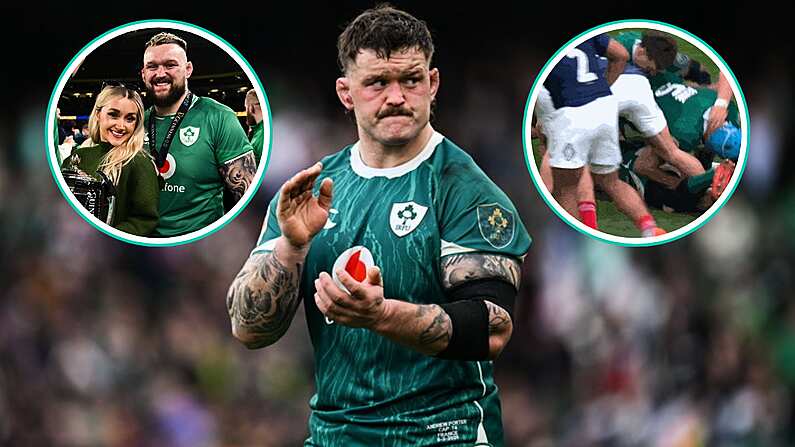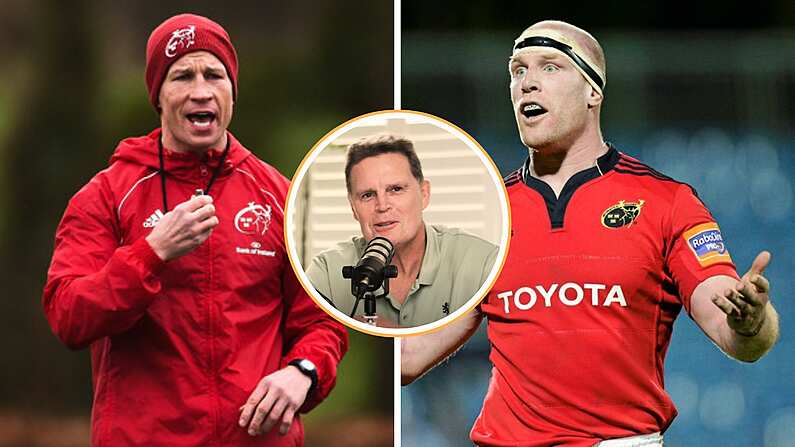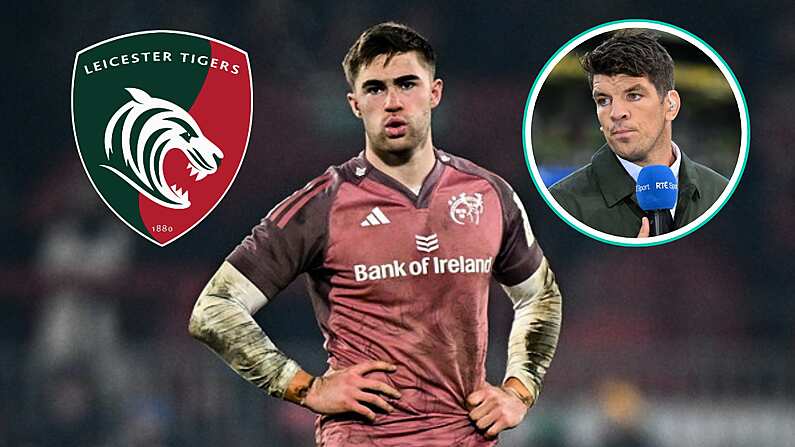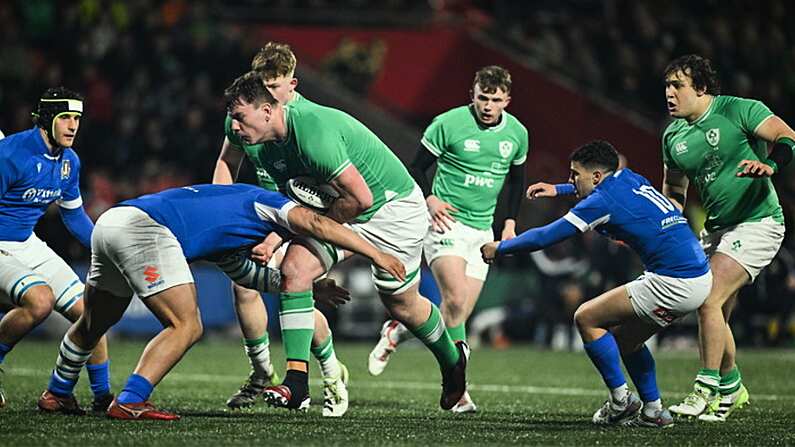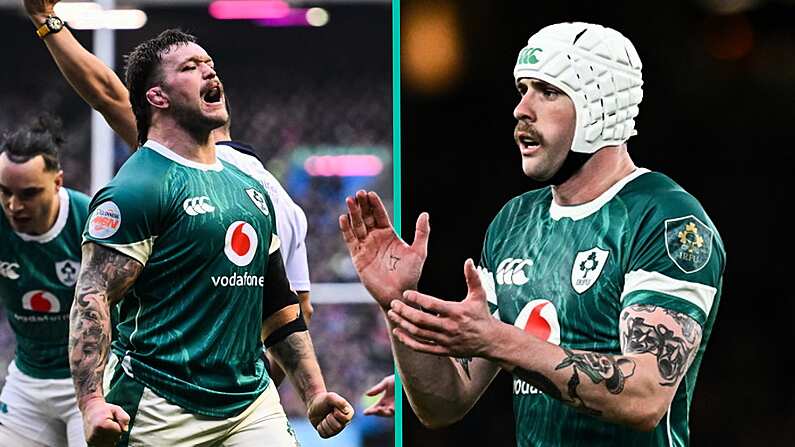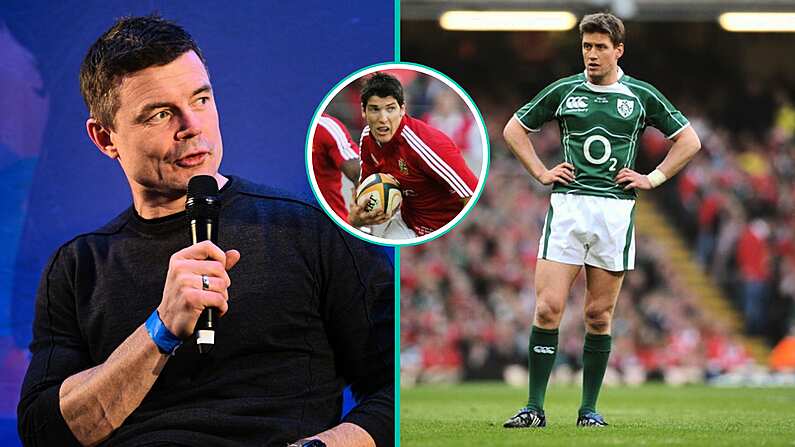"When I saw my friend Martin Johnson's big stubborn head and that lip protruding out even further than usual, I could only smile."
For the sixth time in Six Nations history this weekend, Ireland will face off with England in a Grand Slam-deciding match on the final weekend of the tournament.
It will be just the second time that the scenario sees Ireland gunning for a Grand Slam while England merely play for pride, with the Irish triumph at Twickenham on St. Patrick's Day in 2018 set to live long in the memory.
On three previous occasions, an English Grand Slam charge was halted in memorable fashion by Ireland on the final weekend, in 2001, 2011, and as recently as 2017.
2003, however, may be the most infamous of all. It remains the only time in the competition's history that both sides went into their final game with the prospect of a Grand Slam, and the most recent occasion on which Ireland had a chance to seal a Grand Slam on home soil.
It ultimately turned into a rout. Ireland's young stars, such as Brian O'Driscoll and Ronan O'Gara, had no doubt matured by then - but many had never experienced the pressure of vying for a major honour, not least against the old enemy on home soil. Ultimately, England would knock 42 points on the scoreboard. Ireland could manage just six, from the boot of David Humphreys.
Ireland were rocked before kick-off, however, by an incident that has gone down in Six Nations infamy - and which made English captain Martin Johnson public enemy number one in Irish sporting circles.
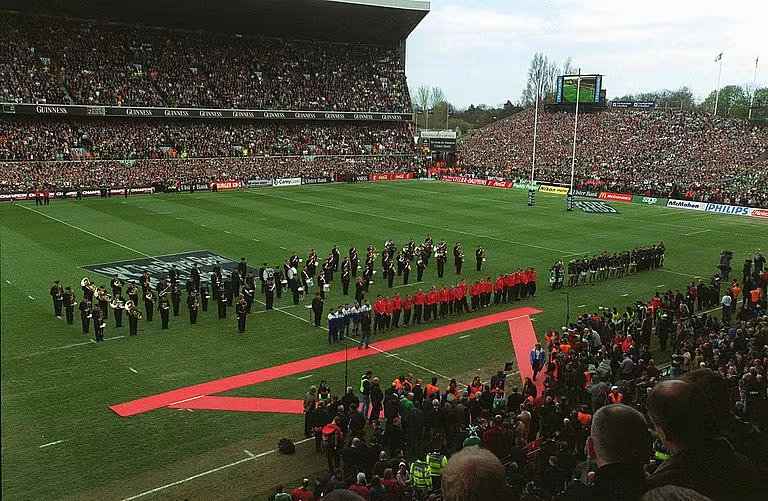
30 March 2003; The England team, who refused to adhere to protocol and stand to the left, and the Ireland team, stand for the national anthems prior to the RBS Six Nations Rugby Championship match between Ireland and England at Lansdowne Road in Dublin. Photo by Pat Murphy/Sportsfile
RTÉ rugby host Tom McGurk would say years later,
It was a day for hating the English, wasn't it? And they gave us a really good reason to hate them.
This is the story of what we're christening "Carpetgate" - in the words of the Irish players who lined out that day, the Englishmen at the centre of the controversy, and those there to witness the extraordinary pre-match scenes in Lansdowne Road.
Part 1: The Buildup
Prior to the 2003 Six Nations, Ireland had won just one Grand Slam in the history of the tournament - even going back to the days of the Home Championship and Five Nations in decades previous.
Despite - by some of the players' own admission - playing poorly in two of their opening four games, Ireland managed a clean sweep of the four including an impressive win over France in Dublin, and a nervy triumph in Cardiff.
All eyes were on Ireland, as an historic achievement beckoned, against one of the strongest English teams in years. In their respective autobiographies, members of the Irish team would remember the pressure that built in the week leading up to the game against England at Lansdowne Road.
Brian O'Driscoll: "Dublin 4 in springtime. The clocks go forward and England are back in town, looking for the Grand Slam they left behind more than two years ago. I sit at the back of a bus moving slowly twoards Lansdowne Road. We look out the window and see the crowds milling about. Green everywhere, as usual on match-day. But this is different. We, too, are four from four in the Six Nations, eighty minutes away from a Slam."
Anthony Foley: "Drico even dared to mention the words 'grand' and 'slam' in a television interview - he was still young, still getting used to the media game. Suddenly, the survivors of the 1948 team, our only slam winners, were being wheeled out for interviews."
Ronan O'Gara: "The hype that week was unreal. I don't think it got to fellas. When you're a sub you don't feel the anxiety anyway but I didn't see any tell-tale signs in fellas' faces."
England were, of course, chasing a Grand Slam of their own. With the old enemies set for an historic winner-takes-all showdown, and England having thrown away potential Grand Slams on the final day in two of the past three seasons, tension was on a knife edge.
Part 2: Carpetgate and the match
As the away side, England emerged first from the tunnel ahead of the anthems, and captain Martin Johnson led his team to the left-hand side of the red carpet - the position traditionally taken up by Ireland ahead of home games.
Whether it be superstition, or nerves, or anger, some members of the Ireland team couldn't bring themselves to stand on the "wrong" side of the carpet - and that was when pandemonium began.
Speaking as part of an RTÉ documentary 20 Moments that Shook Irish Sport, Irish captain Brian O'Driscoll remembered that day in 2003, and assessing what his team's options were when they realised what Johnson and his team had done - while others involved that day had differing attitudes as to what had gone down
Brian O'Driscoll: "Personally, I'd never really thought into which side we stood on and what not. That wouldn't have affected me, to be honest. But some of the lads, as were walking over, said 'they're standing on our side. Let's either stand in front of them, or stand to the side of them.' I said, 'you can't stand in front of them' - you'd be liable to get a box in the back of the head! - 'so we'll just go down the far end of them. The co-ordinator came out and told them to move along, and he [Johnson] told him in no uncertain terms to head off."
Shane Horgan: "It's about losing face, and we certainly didn't want to lose any face. Neither did they."
Tom McGurk: "It really was shitting on somebody else's doorstep, and standing over it, and saying, 'yes, we did it, we're here to take over.'"
O'Driscoll later said in his autobiography that he had "quiet admiration for Johnno over standing his ground," but that he embraced the anger of the crowd and his teammates. He would lead his team further to the left of England, standing away from the carpet.
At the centre of the furore was Irish president Mary McAleese. Traditionally, the Irish team had stood on the left of the red carpet so as to have the president meet the opposing team first, before making her way down to the Irish side of the carpet.
Because of the controversy, and Ireland's refusal to give in to England's perceived mind games, McAleese was forced to walk along the Lansdowne Road pitch while meeting the Ireland team. Seeming entirely unaffected by the whole thing, McAleese gave the crowd a hearty wave, and smiled throughout - even when meeting Johnson.
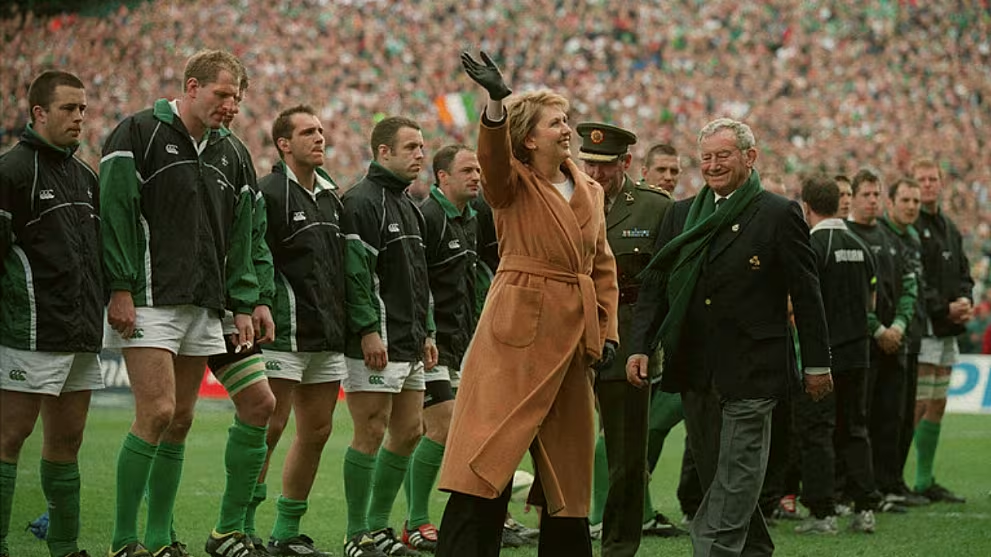
Whether intentional or not, Johnson and England's positioning on the red carpet had laid down an early marker and, 42 points later, it was clear who had come out on top. His Leicester teammate Geordan Murphy knew him better than most and said that, even if Johnson hadn't meant to upset the standard order of things, he was not going to budge even once it became apparent he had:
Anthony Foley: "We really needed Lansdowne to be a cauldron when England came there the following week but it wasn't. We used to get a much better atmosphere for the November tests against southern-hemisphere teams, when the crowd would be almost completely Irish. Six Nations games attracted a fifty-fifty crowd, and the place wasn't intimidating at all. Then we had Martin Johnson's refusal to move, which was a bit of a farce but a psychological boost for them, I'm sure."
Ronan O'Gara: "He got massive stick over it but if I was in his position I'd have done the same thing. Their attitude that day was, 'not an inch'. If he moved it would have looked like they were backing down before a ball was kicked. After that they killed us."
Geordan Murphy: "When I saw my friend Martin Johnson's big stubborn head and that lip protruding out even further than usual, I could only smile. We were told that they were about to be moved. I could have told the officials not to bother trying. Johnno was only going to move if someone physically dragged him from that spot, and he wasn't alone. I could see Neil Back in his ear: 'We are not moving, Johnno!' I genuinely believe he made a mistake when he came out of the tunnel and lined his team up on the wrong side. But in Johnno's mind the match always started once he laced up his boots so, once in position, he wasn't going to budge."
Part 3: The aftermath
So, was England's positioning on the red carpet an intentional attempt at mind games against Ireland, or did Johnson simply make a mistake and refuse to back down?

30 March 2003; England captain Martin Johnson salutes supporters following the RBS Six Nations Rugby Championship match between Ireland and England at Lansdowne Road in Dublin. Photo by Matt Browne/Sportsfile
The Englishman would speak about the incident years later with Donal Leinhan for the Irish Examiner. Johnson claimed that the move was a complete accident - but that he refused to back down, even after realising what they had done. Most importantly, he insisted that no disrespect had been intended towards president McAleese:
I wouldn’t have thought anything about it. But this guy came out of nowhere to move us. It felt like it was just some random guy and I just said, ‘Don’t tell us to do anything, pal’.
And then, BANG, it was just such a huge stand-off and I had that thought in my head: what have we got ourselves into now?
It was never pre-planned, never intended. President McAleese walked onto the red carpet in front of us. Someone said afterwards it was their lucky side, but I’m not fussed with those things. You normally walk out the side that you warmed up on and that is what we did that day.
Geordan Murphy started at 15 for Ireland that day, and was a teammate of Johnson's at Leicester at the time of the incident. Naturally, he would have had a better inclination than any member of the Irish team why the Englishman had chosen to take up residence on the "Irish side" of Lansdowne Road.

30 March 2003; Geordan Murphy, Ireland, is tackled by Martin Johnson,4, and Richard Hill,6, England. RBS Six Nations Rugby Championship, Ireland v England, Lansdowne Road, Dublin. Photo by Brendan Moran/Sportsfile
It remains one of the most contentious moments in the history of this bitter rivalry, and Johnson came out on top. He may have made himself public enemy #1 in Ireland - but he also, at last, made himself a Grand Slam winning captain. Later that year, he would become a World Cup-winning captain, as England kicked on to an historic victory down under against Australia.
Johnson has always protested his innocence - not that he appears too bothered about the incident either - but Irish rugby fans understandably still hold a bitter grudge against the Englishman. Geordan Murphy, however, remembers one fateful night years later, when he won over the people of Naas, at the very least:
Johnno became a hate figure in Ireland for a very long time. However, I think he healed the wounds in one midlands town. Many years later, I asked him, as a favour to me, to speak at a fundraiser for Naas RFC.
'No problem, Geordie.'
I was a little nervous about how he would go down, especially from the reaction I tend to get at home towards him ever sicne the red carpet stance. The swear words are always particularly choice when Irish people are describing Johnno.
Typical of him, that night in my brother's club, he addressed the issue head on, explaining his thought process that day at Lansdowne Road, how he was hurting from previous failed tilts at the Grand Slam, and that he couldn't' move when challenged as the game had already started in his mind. I stood in the wings and tried to gauge the Naas people's reaction. He walked off to a standing ovation.
Owen Farrell, if you so think about making Michael D walk on the grass on Saturday...
Sources
'The Test' - Brian O'Driscoll (with Alan English)
'The Outsider' - Geordan Murphy (with Gavin Cummiskey)
'My Autobiography' - Ronan O'Gara (with Denis Walsh)
'Axel: A Memoir' - Anthony Foley (with Peter O'Reilly)
Martin Johnson (interviewed by Donal Lenihan for the Irish Examiner)
Tom McGurk (speaking to RTÉ for '20 Moments that Shook Irish Sport')




